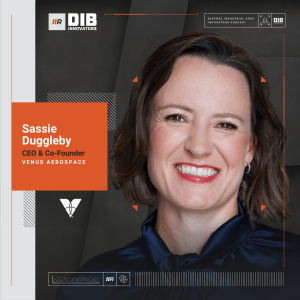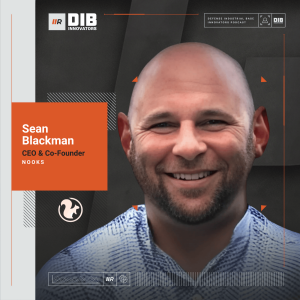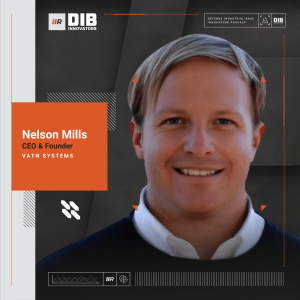DIB Innovators
The DIB Innovators podcast celebrates the brilliant minds behind innovation within the Defense Industrial Base. In each episode, host and co-founder of RADICL, David Graff will speak with DIB leaders who are driving technological advancements, championing our nation’s security, and shaping the future of defense technology. Brought to you by RADICL — Cybersecurity-as-a-Service purpose-built for small and mid-sized businesses in the Defense Industrial Base. Starting your CMMC journey? RADICL guides and accelerates your compliance—while reducing ransomware and other cyber risks—with a transparent, turn-key solution. www.radicl.com/cmmc_solved
Episodes

Thursday Oct 02, 2025
Thursday Oct 02, 2025
Zone 5 Technologies cut cruise missile costs from $1.5 million to $200,000 by rethinking not just the engineering, but how you build the supply chain and factory floor around cost targets from day one. Thomas Akers, CEO, shares how his team goes from contract award to weapon flight in 4 months by keeping engineers right next to the production line, writing all their own software, and doing machining in-house. When a problem hits the shop floor, an engineer can be there in a minute.
The real insight is what he calls their "production-focused requirement set." Instead of designing for maximum performance and then figuring out how to build it, they start with manufacturing rate targets and work backward. Every design decision serves the question: how fast can we make this weapon at scale?
Topics discussed:
Reducing cruise missile costs from $1.5 million to $200,000 through production-focused design and vertical manufacturing integration.
Achieving contract-to-flight timelines of 4 months by co-locating engineers with production staff and maintaining tight feedback loops.
Implementing "production-focused requirement sets" that prioritize manufacturing rate targets over maximum performance optimization in weapon design.
Building affordable mass missiles using turbojet propulsion at 0.7 Mach and 25,000 feet for 500-nautical-mile range capabilities.
Operating as a bootstrap company for 14 years without outside investors to maintain long-term strategic flexibility and control.
Leveraging America's existing machine shop network instead of competing for capacity at specialized defense manufacturing facilities.
Navigating government acquisition through OTA contracts while maintaining proprietary software development and avoiding open-source security risks.

Tuesday Aug 26, 2025
Tuesday Aug 26, 2025
What happens when China sanctions your drone company? For Skydio, it became the catalyst for complete supply chain independence and battle-tested technology that now guides Ukrainian artillery strikes. Mark Valentine, Global Head of National Security Strategy, breaks down the story for Dave: when their drones in Ukraine failed due to single-band radios and GPS dependence, his team made 36 field visits over two years, embedded Ukrainian engineers, and developed Asimov software enabling complete GPS-jammed operation with frequency-hopping radios.
But the real revelation isn't military, it's civilian. While the DoD debates drone strategy, law enforcement has already cracked the code. New York City operates 600 dock-based drones integrated with ShotSpotter and domain awareness systems. Single operators supervise unlimited robots through connected systems and dock-based persistence — capabilities the military avoids due to connectivity phobia.
Mark also offers his leadership framework, distilled from Microsoft's Satya Nadella, centers on distinguishing "two-way door" decisions (reversible, move fast) from "one-way door" decisions (irreversible, deliberate carefully). This becomes critical in startups where you're making calls alone without institutional backup: speed depends entirely on recognizing which type of decision you're facing.
Topics discussed:
Building GPS-denied navigation capabilities and frequency-hopping radios after Ukraine deployment failures exposed drone limitations.
Implementing two-way door versus one-way door decision framework for rapid startup execution without institutional backup support.
Deploying 600 dock-based drones integrated with ShotSpotter systems for 28-second autonomous response in New York City.
Creating platform extensibility through four USB-C hardpoints enabling third-party sensors from grenade droppers to life preservers.
Achieving complete supply chain independence from Chinese suppliers after sanctions targeting Taiwan fire department support.
Enabling single-operator supervision of unlimited drones through connected systems versus the military's disconnected one-to-one approach.
Developing obstacle avoidance AI using six fisheye cameras and eight-layer neural networks for autonomous flight capabilities.

Thursday Jul 03, 2025
Thursday Jul 03, 2025
Defense contractors assume they understand CMMC assessments, but Matt Bruggeman, Director of GTM Federal at A-LIGN, has a harsh reality check for them: organizations consistently arrive for certification without basic documentation like authorization boundaries or data flow diagrams. The gap between CMMC perception and assessment reality is creating a compliance crisis, he tells Dave.
A-LIGN operates as a top-3 FedRAMP assessor and C3PAO, giving Matt unique visibility into federal compliance across multiple frameworks. His unconventional background combining electrical engineering from Wright-Patterson Air Force Base with professional improv comedy shaped his approach to explaining complex technical requirements through clear communication.
Topics discussed:
The assessment methodology uses NIST 800-171A that evaluates 320 assessment objectives rather than just 110 controls, requiring organizations to prove compliance across significantly more granular requirements.
External service provider scope issues that consistently trip up organizations during assessments, particularly around MSP, MSSP, and cloud service relationships that require FedRAMP authorization or equivalent.
C3PAO backlog management and timing strategies, with smaller assessors facing 3-9 month delays while larger firms like A-LIGN maintain shorter timelines through strategic CCA and CCP resource investments.
The three-bucket cost structure of CMMC compliance covering infrastructure changes, readiness process management, and assessment fees ranging from $40,000-$80,000 depending on scope complexity.
Phase 1 documentation review failures where organizations arrive without basic elements like system security plans, authorization boundaries, or data flow diagrams for CUI handling.
Readiness partner selection criteria and the risks of attempting internal-only compliance approaches that result in failed assessments and doubled costs for remediation.
The relationship between compliance frameworks and actual security posture, including how feedback during public comment periods can influence framework development and practical implementation.
FedRAMP equivalency requirements for cloud service providers handling CUI, including the December 2023 DoD memo defining the single pathway through 3PAO assessment against FedRAMP moderate baseline.
Early C3PAO engagement advantages including assessment planning coordination, partner network efficiencies, and pricing benefits for organizations working with vetted readiness partners.

Thursday Jun 26, 2025
Thursday Jun 26, 2025
Venus Aerospace achieved the first flight of a high-thrust rotating detonation rocket engine, proving that decades of theoretical research can translate into breakthrough propulsion technology. Sassie Duggleby, CEO & Co-founder, tells Dave about conducting eight engine tests per day while maintaining manufacturing, mission control, and testing in the same facility compressed development timelines from decades into four years.
The breakthrough enables rockets to operate with 67% propellant instead of the industry standard 90%, creating massive payload advantages for defense applications. Sassie shares their strategic pivot from commercial hypersonic travel to defense applications as geopolitical realities shifted, and how combining detonation technology with ramjet systems creates single engines capable of accelerating from takeoff to Mach 5 with no moving parts. She also addresses advanced fundraising strategies for deep tech companies and regulatory challenges including FAA limitations that forced them to throttle capable systems during testing.
Topics discussed:
The technical breakthrough of rotating detonation rocket engines that achieve supersonic combustion while reducing propellant requirements from 90% to 67% of total system weight.
Rapid iteration methodologies that enable eight engine tests per day through integrated manufacturing, mission control, and testing facilities at Houston Spaceport.
Proprietary thermal management solutions that prevent detonation engines from melting during sustained operation at supersonic combustion temperatures.
Strategic pivoting from commercial hypersonic travel applications to defense programs including missiles, drones, and orbital transfer vehicles as market conditions evolved.
Combined detonation-ramjet engine systems that enable single powerplants to accelerate from takeoff to Mach 5 with no moving parts.
Deep tech fundraising strategies for transitioning from R&D-focused companies to production-scale operations while maintaining investor confidence during market downturns.
Regulatory navigation challenges in hypersonic flight testing, including FAA speed limitations and the development of commercial test ranges for advanced propulsion systems.
The formation and operation of support networks for female aerospace founders in an industry where women represent only 10-11% of the workforce.
Scaling challenges for breakthrough propulsion technologies, including IP protection strategies and the transition from academic research to commercial applications.

Thursday Jun 19, 2025
Thursday Jun 19, 2025
America's defense innovation pipeline has a massive bottleneck that most people don't even realize exists: the infrastructure access problem that prevents our best technology companies and cleared talent from working on classified programs. Sean Blackman, Co-founder & CEO at Nooks, experienced this firsthand as a Navy F-18 pilot trying to get non-traditional companies onto classified contracts, only to discover the catch-22 that has plagued defense innovation for decades. His solution is treating classified infrastructure like cloud computing rather than requiring bespoke facilities
Sean's journey from the cockpit to Meta's anti-misinformation team to highlights why traditional approaches to classified work infrastructure are failing at scale. With 5 million Americans now holding security clearances compared to hundreds of thousands decades ago, the old model of one company, one contract, one SCIF simply doesn't work anymore. The conversation with Dave explores how Nooks is building a network of shared classified facilities that companies can access for $500 per user per month — less than the cost of flying across the country to use traditional SCIFs.
Topics discussed:
The fundamental chicken-and-egg problem preventing non-traditional defense companies from accessing classified work due to SCIF requirements versus contract prerequisites.
How the shift from hundreds of thousands to 5 million Americans with security clearances has broken the traditional bespoke infrastructure model that worked for smaller cleared populations.
The strategic application of fractional biotech lab models to classified infrastructure, creating shared facilities that accelerate innovation through increased access and reduced barriers.
Why 60-70% of existing SCIFs face obsolescence under new government standards, creating an unprecedented recapitalization crisis across the defense and intelligence community.
The operational complexity of integrating over 1,000 different classified networks across agencies that historically avoided collaboration by building separate systems.
The dual-use business model that serves both government agencies facing return-to-office challenges and private companies needing classified access without bespoke facility investments.
Mobile SCIF deployment capabilities that can establish classified work environments anywhere in the United States within eight hours, fundamentally changing geographic constraints.
The security advantages of consolidating classified work into professionally managed facilities with dedicated security focus versus thousands of companies interpreting security policy individually.
Why treating security as a revenue center rather than cost center enables investment in advanced protective technologies that exceed traditional facility capabilities.

Thursday Jun 12, 2025
Thursday Jun 12, 2025
The underwater domain has become central to great power competition, yet existing autonomous underwater vehicles cost $500,000+ and require teams of specialists to operate single units. Nelson Mills, CEO & Founder of Vatn Systems, and his team have flipped this equation, building vehicles that travel 30+ knots underwater while enabling one operator to deploy hundreds of units with minimal training.
Nelson's experience as an investor proved invaluable not just for fundraising connections, but for understanding what investors seek in defense companies and how to structure deals effectively. His focus on user experience draws from consumer technology principles, recognizing that ease of use and intuitive operation create force multiplication effects that traditional defense contractors often overlook.
Topics discussed:
The three-pillar defense sales framework encompassing operator advocacy, program office relationships, and congressional support.
Patent-pending modularity architecture that enables mass production of 2,000+ units annually while supporting diverse payload configurations.
Strategic focus decisions between dual-use applications versus concentrated government market penetration, including resource allocation considerations.
In-house navigation system development to overcome cost constraints of existing high-end solutions while maintaining tactical utility and performance standards.
User experience design principles applied to defense technology, emphasizing intuitive operation and minimal training requirements for force multiplication effects.
Manufacturing digitization through Palantir partnership to identify bottlenecks, supply chain issues, and optimization opportunities in real-time production environments.
Congressional engagement strategies including lobbyist utilization, NDAA language development, and appropriations advocacy as essential components of defense market access.
Valley of death navigation through transitional funding programs while layering products at different technology readiness levels.
Autonomous decision-making capabilities including obstacle avoidance, target recognition through sonar, and mission adaptation without constant human oversight.
Commercial applications in offshore wind, cable monitoring, and energy sector operations as adjacent markets requiring minimal engineering modifications to core vehicle platforms.

Thursday Jun 05, 2025
Thursday Jun 05, 2025
The defense industrial base faces a manufacturing crisis that goes far deeper than workforce shortages, and John Albers, President/CEO of Albers Aerospace has positioned his company at the center of solving it. He grew Albers Aerospace from solo systems engineering to a $10 million vertically integrated manufacturer through 12 strategic acquisitions, all funded internally without outside investment until late 2024. His approach reveals how speed, strategic diversification, and long-term thinking can build resilient defense manufacturing capabilities even as traditional approaches struggle with slow cycles and demographic challenges.
John tells Dave that he attributes his business philosophy to reading Warren Buffett's shareholder letters repeatedly after his first business venture failed. Rather than taking distributions, he focused on building company value through acquisitions that provided both capability and customer diversification. The strategy proved prescient as his company evolved from services into weapons manufacturing, now producing components for F-35, F-16, and multiple missile programs while maintaining aircraft integration capabilities through recent acquisitions.
Topics discussed:
Strategic acquisition approach that prioritizes customer value over traditional ROI calculations, resulting in 12 company purchases funded through internal cash flow and moderate leverage rather than external investment.
Advanced manufacturing integration combining robotics, digital engineering, and traditional machining to maintain competitiveness while addressing skilled workforce shortages through 21-hour automated operations.
Three-vertical business model balancing industrial manufacturing, defense services for predictable cash flow, and innovation incubation to develop scalable solutions across the organization.
Defense industrial base classification challenges where companies face punitive size restrictions that prevent natural growth from small to large contractor status, limiting competition and industrial capacity.
Workforce development crisis stemming from elimination of vocational training programs, creating artificial scarcity in trades that will drive wage premiums and entrepreneurial opportunities for skilled workers.
Leadership philosophy adaptation from military servant leadership principles to business contexts, emphasizing individual thinking and leadership at every organizational level rather than hierarchical command structures.
Weapons manufacturing diversification strategy touching major programs through specialized components rather than platform-specific focus, providing resilience against program cancellations and budget fluctuations.
Veteran transition challenges requiring complete professional identity reconstruction rather than translating military experience directly into civilian business contexts, emphasizing humility and continuous learning.
Manufacturing cycle management addressing the extended timelines from quoting through material procurement to delivery, requiring sophisticated financial planning and pricing strategies to maintain profitability.
Customer-centric problem solving approach that prioritizes understanding client pain points over presenting predetermined solutions, leveraging acquisition experience to maintain customer perspective throughout business growth.

Thursday May 29, 2025
Thursday May 29, 2025
The Ukrainian conflict revealed a stark reality that should light a fire under American defense planners: modern warfare consumes weapons at rates that would exhaust our entire arsenal in months, not years. In his conversation with Dave on the latest DIB Innovators, Kunal Mehra, President of Scientific Systems, brings a unique perspective to solving this crisis, shaped by his family's experience fleeing partition-era India and his father's determination to strengthen democratic nations through advanced technology.
Kunal argues that our addiction to "exquisite systems" has created a fundamental mismatch between 20th century military thinking and 21st century threats. The solution requires abandoning the hardware-defined military model in favor of software-defined capabilities that can rapidly turn commercial platforms into effective weapon systems. Scientific Systems' CMA platform demonstrates this approach across three layers: individual platform navigation without GPS, collaborative swarm coordination, and cross-domain orchestration. This architecture has proven adaptable from sea floor to space, enabling autonomous kill chain closure from detection to engagement.
Topics discussed:
The affordable mass imperative and why exquisite systems fail against distributed threats across vast Pacific distances with adversaries achieving numerical superiority.
CMA software architecture's three-layer approach: platform-level navigation without GPS, swarm collaboration for complex missions, and cross-domain orchestration for autonomous kill chains.
How underwater development environments naturally replicate contested battlefield conditions, forcing edge-based AI decision making with limited communication and sensor data.
The acquisition system evolution from winner-take-all programs to separated software/hardware procurement with constant competition cycles every six months.
Strategic approaches to crossing the valley of death through end-user demonstration, congressional relationships, and clear value propositions to prime contractors.
Why the defense industrial base needs billion-dollar software companies with developers embedded in operational environments for real-time capability iteration.
The capital allocation shift as venture firms recognize defense market disruption opportunities beyond traditional West Coast unicorns.
Project Replicator and DIU methodologies for rapid capability fielding using OTAs and special authorities to bypass traditional acquisition timelines.
Dual-use technology applications in urban air mobility, industrial automation, and re-industrialization efforts requiring edge-based autonomy capabilities.

Thursday May 22, 2025
Thursday May 22, 2025
When America's adversaries can outbuild us in ships, what's our strategic advantage? Paul Lwin, CEO & Co-founder of HAVOCai, shares how his company is revolutionizing maritime operations by creating affordable autonomous vessels that can operate in swarms. As a Myanmar refugee who first saw American uniforms during his evacuation at age 10, Paul brings a unique perspective to defense innovation, combining his military experience with Silicon Valley approaches to solving national security challenges.
On this episode of DIB Innovators, Paul tells Dave about how, in just 17 months, HAVOCai has delivered 31 autonomous vessels to the Department of Defense, generated $3 million in revenue without government R&D funding, and demonstrated capabilities that outpace competitors who've been in the space for over a decade. Their conversation highlights how defense startups are creating asymmetric advantages for America by leveraging commercial manufacturing capacity, off-the-shelf components, and sophisticated software to transform maritime operations in the Pacific.
Topics discussed:
Creating a strategy where adversaries must spend million-dollar missiles to target $100,000 autonomous boats, creating favorable cost exchanges in conflict scenarios.
Leveraging existing American manufacturing capacity and proven commercial components rather than building expensive custom solutions from scratch.
Developing software that enables small teams to control dozens of vessels simultaneously, creating true swarm capabilities rather than the 90% remote-controlled systems offered by competitors.
Abstracting away boat building to focus engineering resources on sophisticated algorithms that enable autonomous decision-making and collaborative behavior.
Implementing theatre-level, sector-level, and unit-level command structures that mirror traditional military organization while integrating autonomous capabilities.
Using autonomous vessels to resupply isolated units on island chains when traditional air logistics would be vulnerable to enemy fire.
Building resilience into autonomous systems that can continue missions for days or months without human input when adversaries jam communications.
Integrating COLREGS compliance for commercial environments while maintaining tactical capabilities for conflict scenarios.
Leveraging the unprecedented convergence of government acquisition reform, venture capital interest in defense, and Silicon Valley technical talent to accelerate innovation.
Creating logistics and manufacturing processes capable of delivering up to 10,000 vessels annually when required for operational deployment.

Thursday May 15, 2025
Thursday May 15, 2025
When Rhys Andersen, Founder & CEO at Method MFG, moved to Texas with an architecture degree, he never imagined he'd end up machining components for spacesuits and rockets. Yet his journey from welding to founding his company exemplifies the untapped potential in American manufacturing. By combining cutting-edge technology with a focus on upskilling his entire team, Rhys has created a manufacturing environment that more closely resembles a tech company than a traditional machine shop — with white walls, white floors, and sophisticated software driving everything from quoting to production.
Rhys also shares with Dave his practical experience building a bootstrapped manufacturing company servicing aerospace and defense clients, including his counterintuitive approach to workforce development and the technologies revolutionizing production. His insights demonstrate why manufacturing's image problem is holding back America's industrial base, and how rebranding machining as the tech profession it truly is could help solve critical workforce shortages.
Topics discussed:
Bootstrapping a capital-intensive manufacturing business by purchasing used equipment at a fraction of the cost for new pieces, while supplementing income through with other work to fund the company's early growth.
The transformation of machining into a tech profession where white-collar programmers operate sophisticated 5-axis equipment and automation cells rather than traditional machine operators.
Creating comprehensive cross-training programs to eliminate single points of failure by ensuring every machinist can program and operate the company's most sophisticated equipment.
Leveraging technology as a multiplier through automation cells with robots that can change their own end effectors to handle everything from small vises to 900 kg pallets for unattended overnight production.
The critical role of process documentation using iPads in the shop to capture setup photos and detailed notes, creating an institutional knowledge repository that prevents "reinventing the wheel" with repeat jobs.
Strategic vertical integration decisions like building an in-house anodizing line to control quality and turnaround times for quick-turn aerospace components rather than relying on external vendors.
Managing complex stress patterns in large aerospace components by creating strategic relief cuts and adapting clamping approaches to ensure finished parts maintain tolerance despite internal material stresses.
The potential of AI-driven programming to automate routine aspects of CAM while allowing machinists to focus on more creative problem-solving and complex machining strategies.
Rebranding manufacturing careers through educational partnerships showing students that modern machining involves sophisticated software, 5-axis programming, and automation rather than traditional manual labor.

